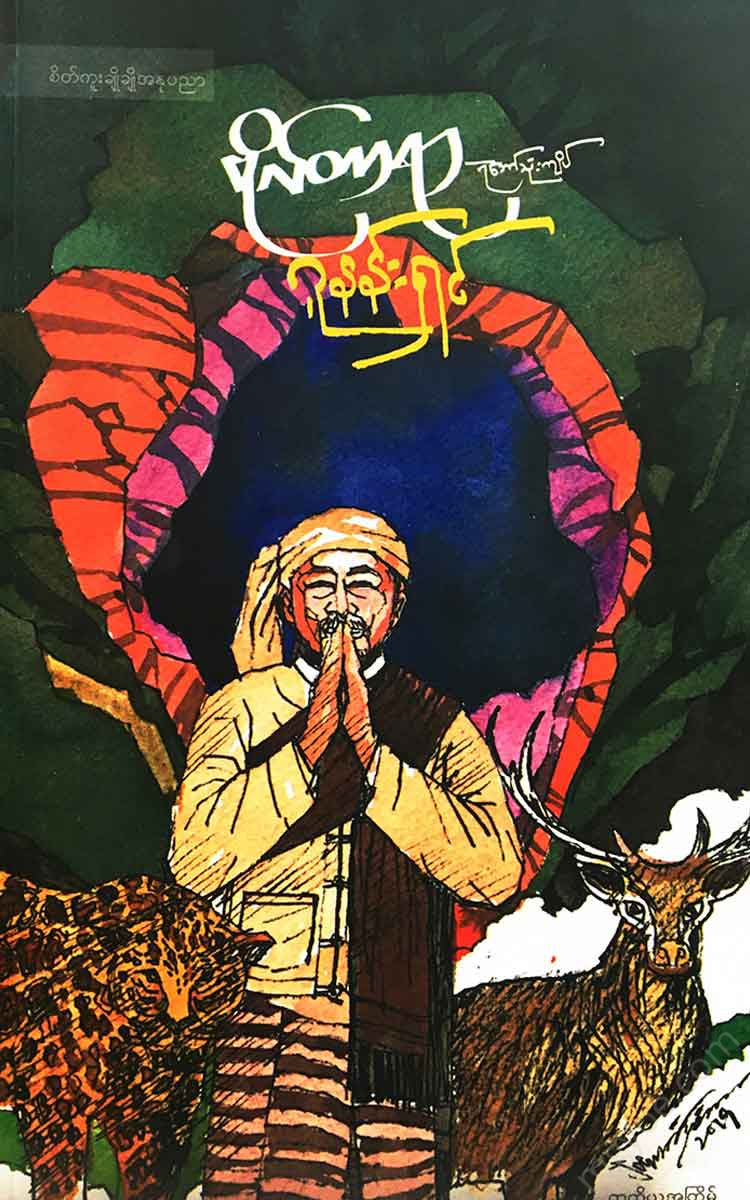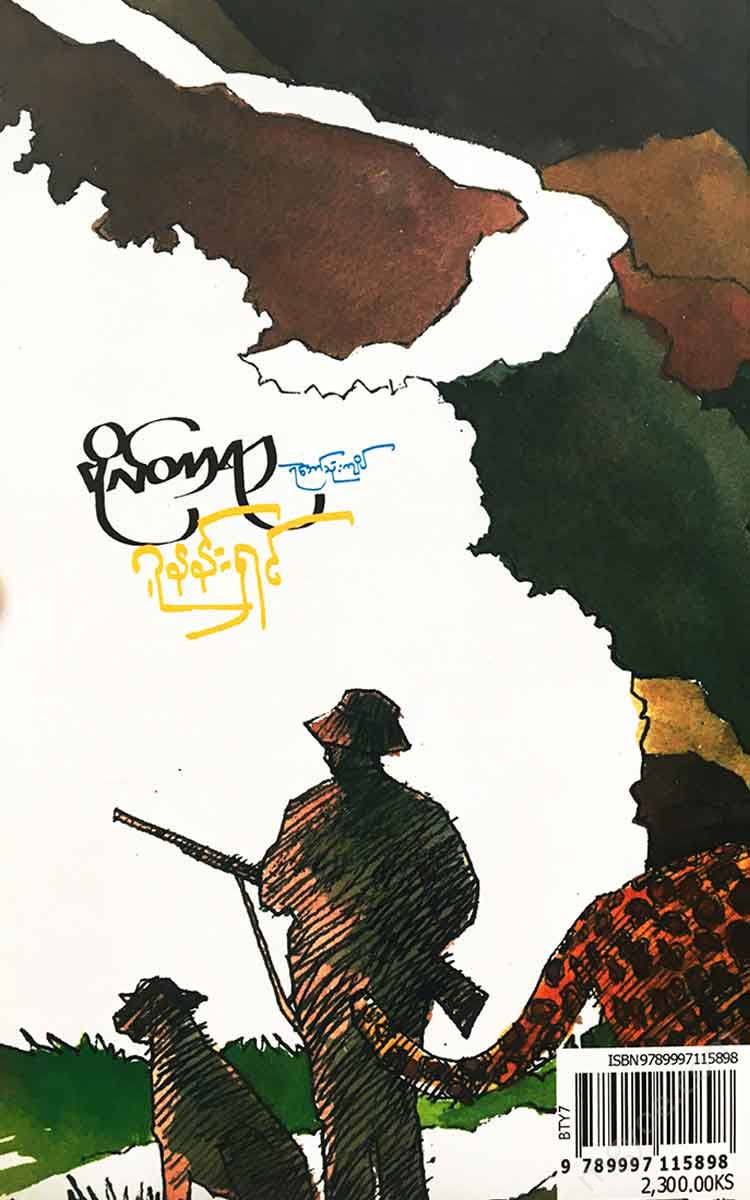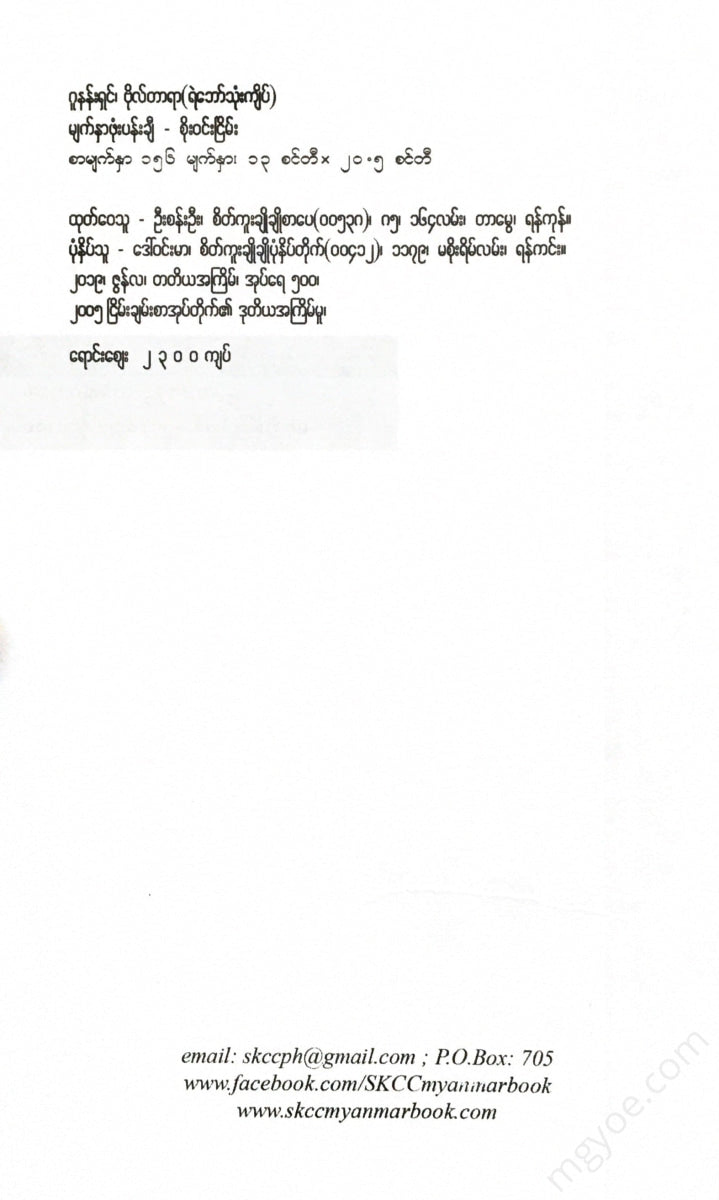စိတ်ကူးချိုချိုစာပေ
Bo Tara (Three Comrades) - Gu Nan Shin
Bo Tara (Three Comrades) - Gu Nan Shin
Couldn't load pickup availability
East and West
The power of the mind is so mysterious that it is full of amazing facts. There have been many people who have thought and written about the power of the mind. There have been personal experiences, personal observations, and opinions, as well as true and false issues, thoughts, and very brilliant and strange biographies. Burmese Buddhists believe in and practice spirituality or spirituality. However, for Europeans, they follow materialism fanatically. It is just a matter of personal experience, your own ideas, your own ideology, and what you believe and know.
The Buddha, the supreme power and wisdom of the thirty-one realms, also spoke extensively about the main parts of the mind and how important they were. Every person, including the author, under the Buddha's Golden Wisdom Network
I also enjoyed the opportunity to study and learn as much as I could, approaching the wonders of psychology through the lens of morality.
As far as the author himself knows, he has had the privilege of studying and experiencing some amazing events and experiences, as the saying goes. Therefore, the author
In documenting the events of his comrade-in-arms, Captain Aung Min Kyaw, the "Great Mountain Queen" novel was based on a part of the author's spiritual beliefs and brought them to the literary court.
To be honest, I had to leave out the subsequent events of Captain Aung Min Kyaw because the current circumstances did not allow me to continue writing about them. I will try to continue writing about Captain Aung Min Kyaw's subsequent events in the future, when the opportunity arises, and when it suits the interests of the future.
There are many facts that need to be described in this novel, many facts that cannot be hidden, and many facts that are too well-known to be covered up. The relatives and descendants of the people who participated in the facts and suffered from them are still alive today, so the author avoids writing about the personal and social aspects, avoids writing about the exact place of residence and the names of the people, and instead uses a pseudonym or a pseudonym and places of residence to report the true events that actually happened behind the scenes.
Regarding the events described, the author, as a sixth-grade student who was just starting to understand the facts, was in urgent consultation with his brother, a police officer, and his colleague, a police officer, and friends who had participated in the events. Based on the collective memory of the events, which were on the lips of the entire public at that time, the author himself collected as much accurate information and facts as possible over many years, and took the time to obtain reports from many villagers in the area, and then relayed the facts to the literary audience.
That was the time when the British colonial government was at its peak. It was also a time when few dared to oppose the will of the British government. I remember that it was a time when the country's elite, the politicians who were like the heads of the country, and the intellectuals who were like the brains, were all parasitic on the British government's wishes and were trying to maintain their positions and wealth. However, in the cases mentioned, there were many stubborn villagers and villagers who opposed the policies of the British government and defied the orders of the petty civil servants and the criminal ministers, and many acts of protest and violation of the law were seen in the author's records. After the entire region was shaken by the religious and sectarian unrest, the British colonial government realized that their actions were wrong, and that the accused they had arrested was innocent and was only working for religious reasons. They used cunning tactics to cover their actions with goatskin and forcefully close the case, revealing their great mistake.
However, the work of their police officers and the daily records of the police department, known as the case file (GD), were not destroyed in time, and the author has come into possession of the official contract and documents that will provide solid support for bringing this literary work to court.
Therefore, the author has been able to present this Gu Nan Shin At-Kapti to the literary court based on official documents, case files, the statements of relevant police officers, and the author's own interrogation of relevant villagers and eyewitnesses.
But when the author thinks back to the events he himself heard and saw at that time... the events in front of him seem to appear like a movie.
***
The evening in Pyinmana was pleasantly peaceful. As the sun set in the west, the clouds in various shapes and forms danced in the sky. It was mid-winter, and a cold breeze blew in from the north.
It was time for the office and school to end, and we could see a large crowd of students, office clerks, and clerical workers returning to their homes.
One of my brothers, a criminal police officer, returned home from his duties at the Pyinmana Police Department and was lounging in a comfortable armchair, reading a copy of the daily newspaper.
"Hey, China, what's up, you're so tired already?"
With a loud noise, a man in a police uniform, full of pomp and circumstance, entered the apartment where our family lived.
"Hey... San Win, you're so arrogant, you're just going to this city for work, that city for work, and counting the days, and you're just doing your duty at the gate..."
My brother greeted his schoolmate, the criminal mastermind U San Win, and offered him a chair.
U San Win took off his khaki shirt with his criminal insignia, put on a pair of wide-leg pants, and sat down on a chair.
"The police department is already in a state of chaos. The entire east side is surrounded by crowds, my friend. The DSP himself came to scold the head of the department, who has a big mouth. The case is very strange, huh..."
He recounted the news of what happened at the Pyawbwe Police Department, which he personally experienced.
"How are you, old man, try it, I think the big eared one is drunk and has started to bark again. This old man, if he does anything, everything will be for nothing, and when he gets drunk, he won't even wake up."
Bo Tara (Comrade Thirty) That era was the heyday of the notorious bureaucratic and corrupt police. Whatever officials did was considered a good time. No matter how much trouble or wrongdoing an official did in the outside world, the more he could worship and befriend the white-faced officials, the more his punishments would automatically disappear. This was a bad era, a time when "let it disappear" was inevitable.
The phrase “Napauk Gyi” in the conversation between my brother and U San Win is very meaningful. It is because of the nickname “Napauk” that the police officers who graduated from the police academy and the criminal police officers were given and called.
At that time, the Burmese police officers, now known as the police, were usually old men with long service lives. That's why they had piercings, large earlobes, and were very respectful of their superiors.
The British government at the top promoted these former police officers to positions of their own choosing, bestowed them with titles and honors at ceremonies, and used them to strengthen their British rule and prolong the life of Burma. For this reason, it is necessary to present an old system of bribery that was very popular and fashionable at that time.
When the superiors, from the Minister of Justice, the Minister of Justice to the Inspector General, were in power, one step at a time, the younger ones, when they were in a position of power, had important matters to deal with, and when they were in a position of power, a very effective way of bribing was to secretly send their own sisters-in-law, nieces, and even their own daughters and wives to the superiors, and ask them to go and plead their case. The very knowledgeable, white-faced officials, both big and small, treated the envoys with “respect” and respected everything the envoys said and all the rights they asked for. After the matter was settled, they would sign and give it to them - this was a disgusting form of bribery in the imperialist system.
The “big eared” department head U Htun Seng, whom my brother and U San Win are talking about, is also a top-ranked bribe taker. He has two sisters-in-law, three daughters, and two sons, and he can only advance in his position if he can maintain his reputation and work hard. He is a former police officer with little education, so his only way to please his superiors is to use various bribes and pretend to be loyal to the white-faced masters above him and follow their orders without fail.
There were some junior officers who envied U Tun Seng's lack of education and becoming the chief of the Pyaw Bwe Police Department, but there were also those who were afraid of U Tun Seng's power and tricks and watched from the sidelines. U Tun Seng was a man who used the old bureaucratic system of pushing up and down, and he drank alcohol like water. He himself rose to the position by bribing his superiors, and U Tun Seng was also a very skillful and expert police officer in taking bribes from his subordinates, elders, and clients, from money, gifts, oil cans, and clothes.
"Tell me, San Win, what kind of issues are you worried about, DSP?"





